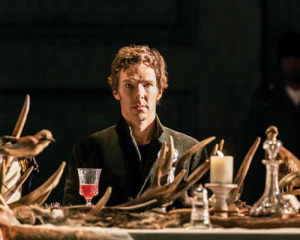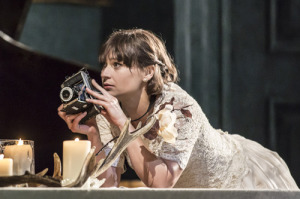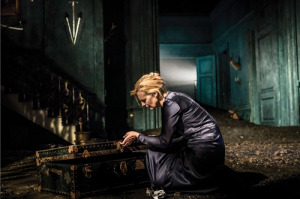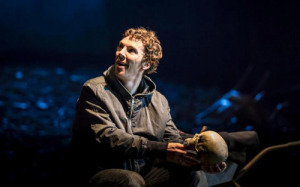Shakespeare’s exiles
by Mika Provata-CarloneA tempestuous and disproportionate furore erupted in the media after Benedict Cumberbatch used stronger terms than usually expected to entreat the audience at a recent production of Hamlet at the Barbican to show support for the refugees arriving on Europe’s shores. The actor’s reaction, after being presented with a CBE by the Queen for his services to the theatre and to charity, was that it is the duty of a person in the public eye to raise awareness for charitable causes and for humanity, and that the stage is the natural place for such actions.
Regardless of the expletive he used on that single night, Cumberbatch is poignantly, unshakeably right. From the Greeks to Shakespeare, to the finest contemporary authors, what matters and what moves us most in the theatre is its power to penetrate our souls, speak the unspoken, show what we fear to look at, acknowledge and address. Theatre is true to its purpose when it acts as the catalyst to our faded or forgotten humanity, when it invites us to share human experience beyond our personal condition, since nothing human should be alien to us.
And Shakespeare is a master in creating what Aristotle called ‘methexis’; devising seemingly straightforward plots (star-crossed lovers, jealous husbands, stranded political exiles, power-greedy counsellors, heroic or not so heroic kings in times of historical and national upheaval), but endowing them with transcendental and universal significance that affects us instantly, eternally. Shakespeare touches human truths and wounds, happiness and pain, glory and disaster, addressing us in our fundamental human essence – he knows to make us listen and participate whether we ourselves are lovers, husbands, counsellors, kings, heroes, or simply illiterate peasants and street-vendors.
In this production we are transported by the sheer ‘craft of speaking Shakespeare’, by the gripping acting force of the bulk of the cast, by the ingenious manipulation of our perception of time.”
A second ongoing furore has received less attention: “What is the best way to understand Shakespeare,” Chris Smyth asked in The Times, and who is up to it? Julian Fellowes would have us only be scholars of Elizabethan and Jacobean drama before attempting to approach a Shakespearian text, for Sir Anthony Sher it is “the craft of speaking Shakespeare” that truly matters; Sir Ian McKellen dismisses the folios and the quartos in exclusive favour of the stage, while Sir Anthony Hopkins advocates reading, since Shakespeare is “about getting a knowledge of civilisation, a knowledge about how humans think”. Perhaps Shakespeare intended us to aim for all of the above, just as he created all his characters to be singular and plural at the same time, established members of society and fleeing refugees, almost all of them exiles, whether political, social or psychological. Shakespeare is as complex as he is simple. He is as distant as he is direct, and it is our determination to be mere spectators or true witnesses that is the vital force. We admire Shakespeare, but we still grapple with what we have convinced ourselves are Shakespeare’s ‘difficulties’. We return to Shakespeare like the compass needle to the North, and each return is different, whether because we are informed by new experiences, or because through interventions in staging and contextualisation, we seek to hear another timbre, another truth, one more connection and correlation in the dramas and the comedies.
In the National Theatre/Barbican production, director Lyndsey Turner offered a resolutely syncretic Hamlet, one that harked back to the Shakespearean stage, to Olivier, Bergman, Branagh, and to the current emphasis on greater popular inclusiveness. Es Devlin’s set design is gorgeously imaginative, sumptuously creative, and resonantly symbolic. The historical and cultural references sometimes become overpowering and uncritical – from Cumberbatch’s WWI costume coloratura and retro record player in the opening scene or the kokoshnik style of Gertrude’s headdress during the wedding banquet, to Horatio’s tattooed eternal student-cum-backpacker persona and Ophelia’s blue-stocking-with-camera undertones. Do we understand Shakespeare better if we particularise every dramatic instant or utterance by means of endless referencing? The overall thrust and calibre of this production, however, is such that we are simply transported – by the sheer “craft of speaking Shakespeare”, by the gripping acting force of the bulk of the cast, by the ingenious manipulation of our perception of time, which slows down and resumes its rhythm throughout the play, signalling Hamlet’s complex relationship with memory and reality.
One of the elements of Turner’s dramaturgy that makes the production exquisitely unique is diction, the naturalness with which most of the cast speak Shakespeare’s words. We lose none of the lilt, the poetry, the tremendous metre, but also not a modicum of meaning: these are real voices speaking, souls feeling, minds troubled and hearts at war. Cumberbatch is a memorable, haunting Hamlet, striking a fine balance between rebelliousness, strength and weakness, righteousness and tragic confusion. His “to be or not to be” scene is full of beauty, madness, premonition, but also hope and vulnerable innocence. Anastasia Hille is a definitive Gertrude, majestic, deliciously naïve and blind – and also pregnantly ambiguous. Both find their perfect reflection in Ciarán Hinds’ Claudius, sublime as the regal, self-indulging bully with hints of The Godfather, whose other side is the effeminate aesthete. Karl Johnson’s Ghost is superb, gentle and terrifying at the same time, intangible and crushing. Jim Norton’s Polonius is one of the finest treatments of the role, and the casting of Kobna Holdbrook-Smith as Laertes creates a riveting dynamic and subtext, together with the impish, perfectly vaporous Rudi Dharmalingam and Matthew Steer as Guildenstern and Rosencrantz. Sian Brook’s Ophelia has moments of doubt and uncertainty, especially in the early parts of the play, but she becomes electrifying as her character develops (or utterly dissolves). She especially liberates the role from the ‘maiden’ stereotype. The production’s feet of clay are Leo Bill’s Horatio, a confused, inchoate, often incoherent delivery, further handicapped by the choice of costume and characterisation, and Ruairi Conaghan’s Player King, whose wooden delivery of the tale of Hecuba utterly shatters the brittle balance between acting and being, fiction and truth, dream and life, so central to Hamlet’s state of thought and mind. Conaghan leaves us with a dry sense of bored irony, which appears to leave even Cumberbatch momentarily perplexed, yet this suspension of the flow does not affect the overall momentum of the play, which escalates breathtakingly, and with engrossing visual expressiveness, as the stage is flooded with debris pre-empting the end of Hamlet’s world and of the Kingdom of Denmark.
The production was also broadcast as part of the National Theatre Live series, and even on screen, this is a spellbinding experience: Lyndsey Turner has succeeded in creating a Hamlet that brings out with special fragility and endurance the providence in the fall of a sparrow, perhaps the truest answer to the question of whether one should or should not be, act or not act – give or not give.
Mika Provata-Carlone is an independent scholar, translator, editor and illustrator, and a contributing editor to Bookanista. She has a doctorate from Princeton University and lives and works in London.
Hamlet continues on limited release in cinemas across the UK and internationally.
More info





